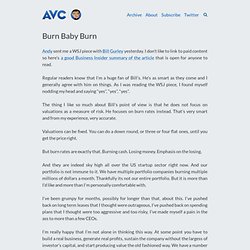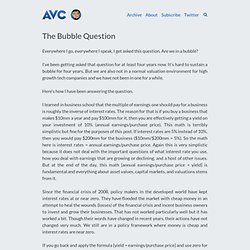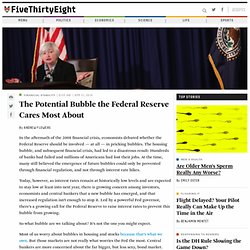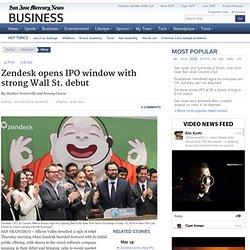

Will Boom Lead to Bust in Silicon Valley. Venture Capitalist Sounds Alarm on Silicon Valley Risk - WSJ. Burn Baby Burn. Andy sent me a WSJ piece with Bill Gurley yesterday.

I don’t like to link to paid content so here’s a good Business Insider summary of the article that is open for anyone to read. Regular readers know that I’m a huge fan of Bill’s. He’s as smart as they come and I generally agree with him on things. As I was reading the WSJ piece, I found myself nodding my head and saying “yes”, “yes”, “yes”. The thing I like so much about Bill’s point of view is that he does not focus on valuations as a measure of risk. Valuations can be fixed. But burn rates are exactly that. And they are indeed sky high all over the US startup sector right now. I’ve been grumpy for months, possibly for longer than that, about this. Now Marc Andreessen Says Tech Has a Burn Problem, Too. Marc Andreessen sur Twitter : "@pkafka It is possible to overdo a good thing. Which is what I'm worried about now."... The Bubble Question. Everywhere I go, everywhere I speak, I get asked this question.

Are we in a bubble? I’ve been getting asked that question for at least four years now. It’s hard to sustain a bubble for four years. But we are also not in a normal valuation environment for high growth tech companies and we have not been in one for a while. Here’s how I have been answering the question. I learned in business school that the multiple of earnings one should pay for a business is roughly the inverse of interest rates. Since the financial crisis of 2008, policy makers in the developed world have kept interest rates at or near zero. If you go back and apply the formula [yield = earnings/purchase price] and use zero for yield/interest rate, then one would pay an infinite amount for an earning stream.
At some point this will change. The other thing we have noticed is that this low rate environment has caused asset value/earnings ratios to be non-linear. I have no idea when and if that will happen. The Potential Bubble the Federal Reserve Cares Most About. In the aftermath of the 2008 financial crisis, economists debated whether the Federal Reserve should be involved — at all — in pricking bubbles.

The housing bubble, and subsequent financial crisis, had led to a disastrous result: Hundreds of banks had failed and millions of Americans had lost their jobs. At the time, many still believed the emergence of future bubbles could only be prevented through financial regulation, and not through interest rate hikes. Today, however, as interest rates remain at historically low levels and are expected to stay low at least into next year, there is growing concern among investors, economists and central bankers that a new bubble has emerged, and that increased regulation isn’t enough to stop it.
Led by a powerful Fed governor, there’s a growing call for the Federal Reserve to raise interest rates to prevent this bubble from growing. So what bubble are we talking about? Most of us worry about bubbles in housing and stocks because that’s what we own. Zendesk opens IPO window with strong Wall St. debut. By Heather Somerville and Jeremy Owens Posted: 05/15/2014 03:47:54 PM PDT0 Comments|Updated: a day ago SAN FRANCISCO -- Silicon Valley breathed a sigh of relief Thursday morning when Zendesk barreled forward with its initial public offering, with shares in the cloud-software company jumping in their debut and bringing calm to recent market turbulence.

What would have been a relatively routine IPO last year or even a few months ago, was highly anticipated and carefully watched by the tech community as a barometer of the tech market, which tanked in April. As Zendesk stock opened above its initial pricing of $9 a share, and soared almost 49 percent higher in morning trading, not only did the company's three founders cheer, but so did the many tech companies waiting on the sidelines for their turn to go public. Zendesk CEO & Founder Mikkel Svane rings the Opening Bell at the New York Stock Exchange on May 15, 2014 in New York City.